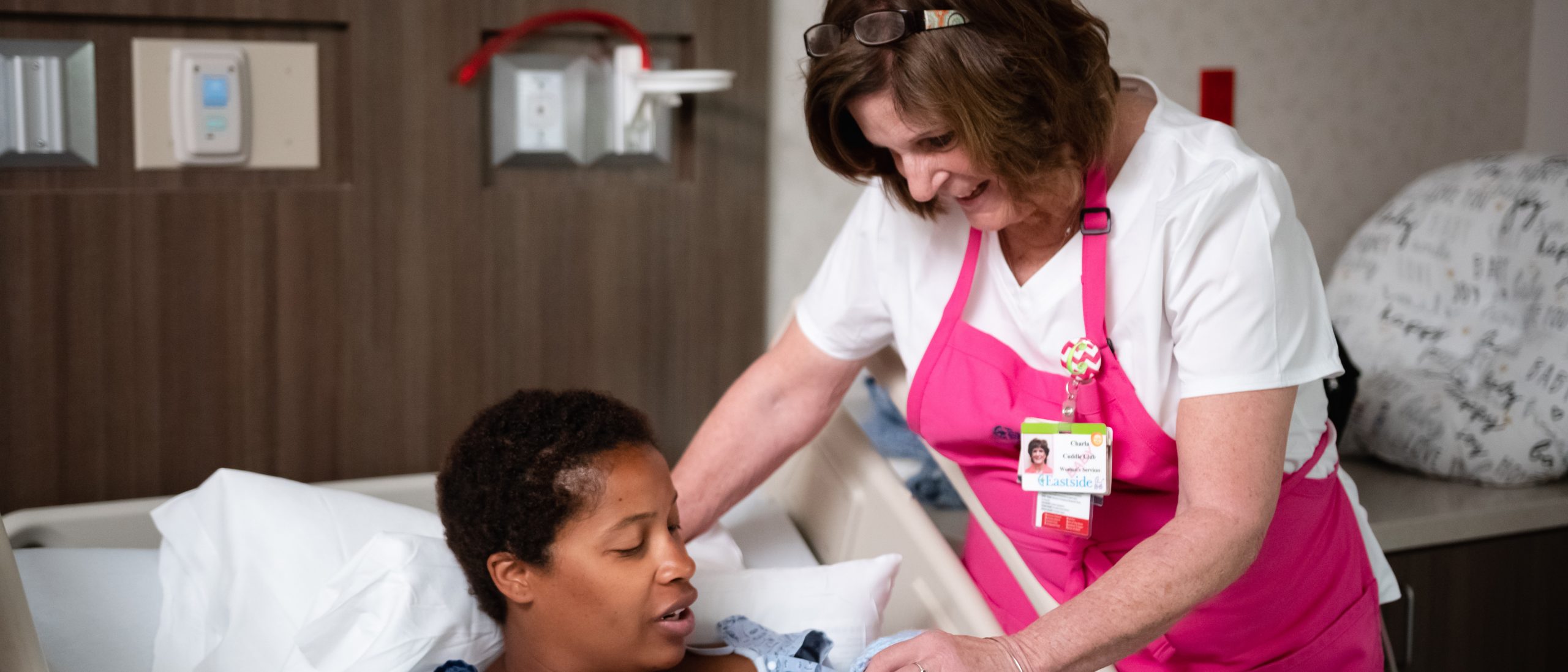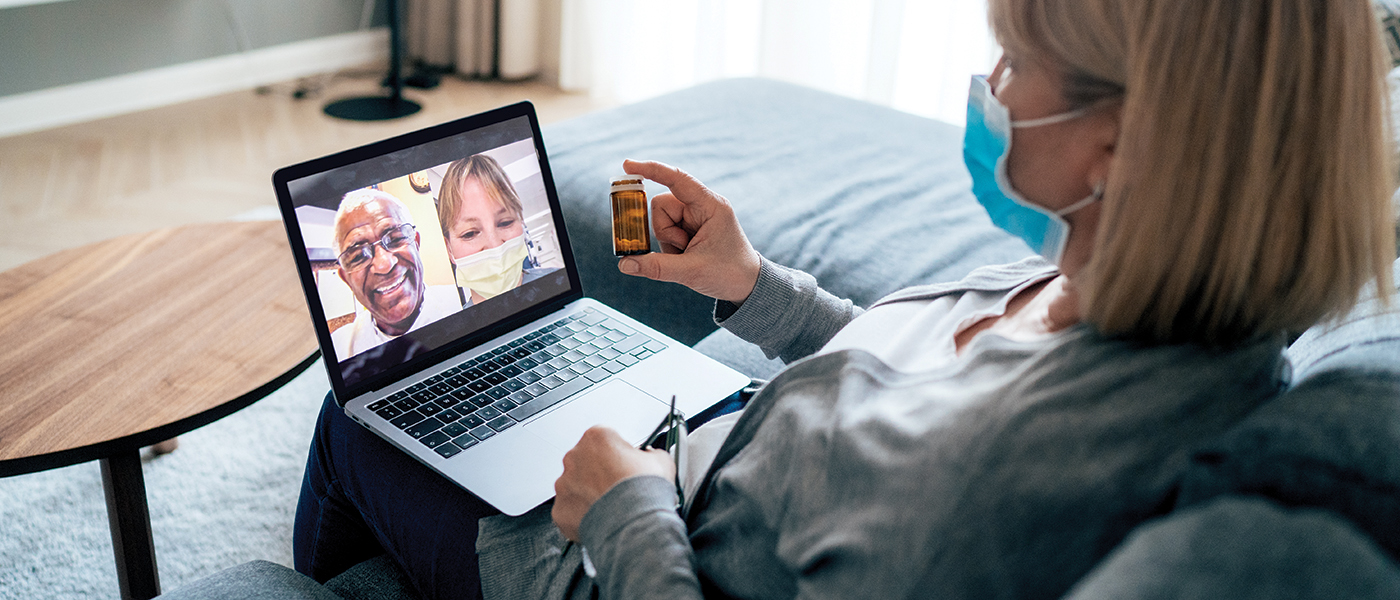Putting people first is part of our culture at HCA Healthcare.
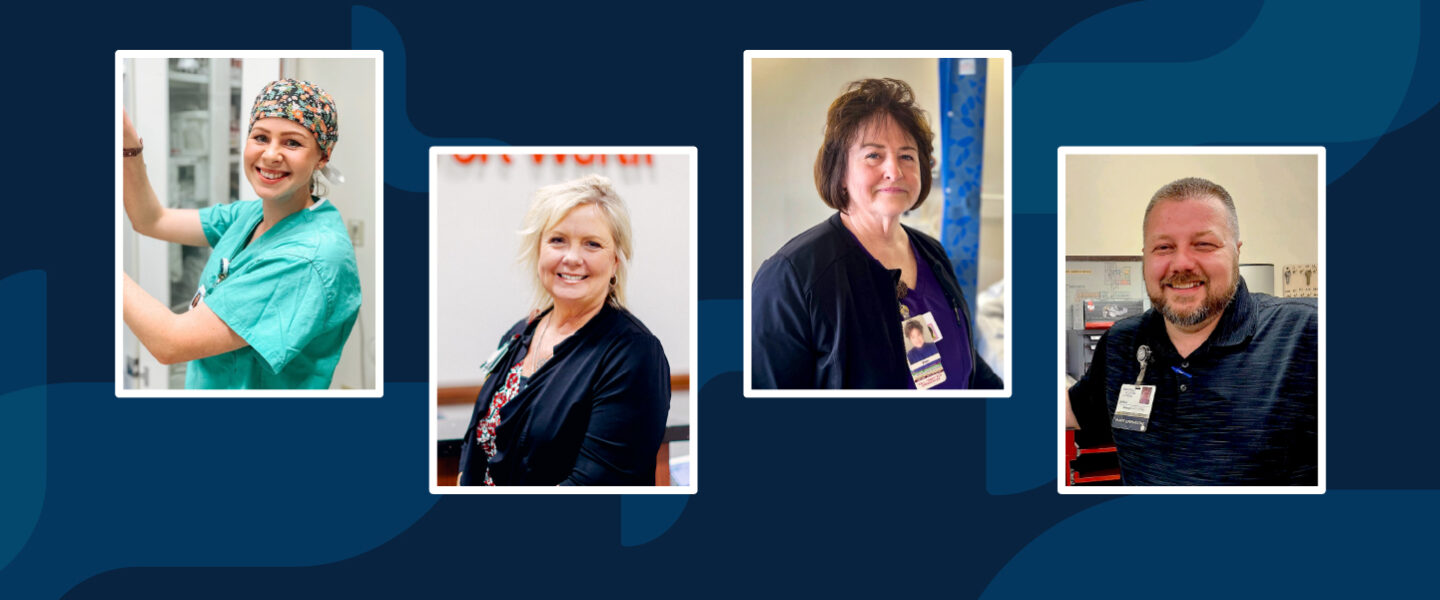
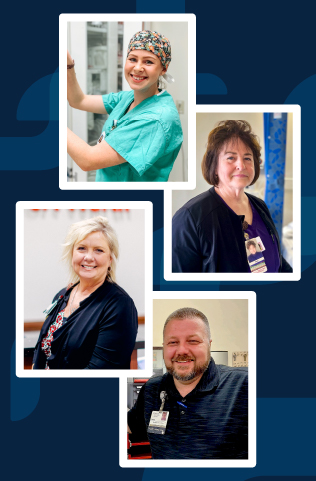
Whether interacting with patients and families or keeping facilities running from behind the scenes, our colleagues play a vital role in the care and improvement of human life. Meet four colleagues who show a true passion for people and have dedicated their lives to helping others.
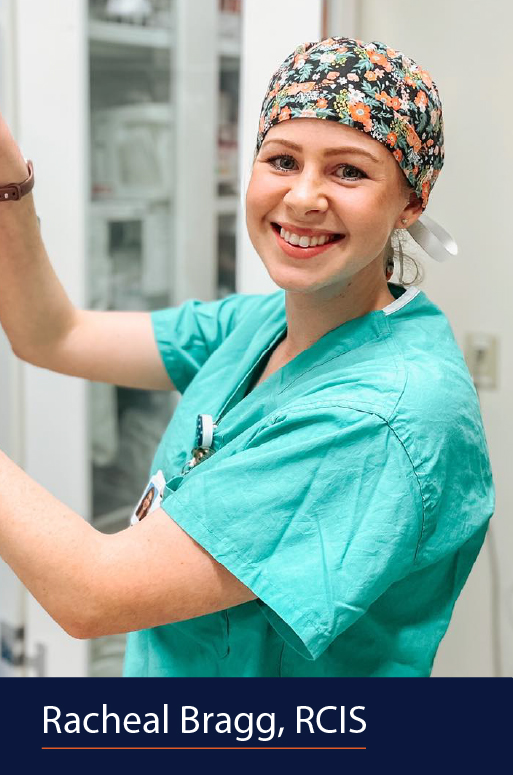
Family is the bedrock of Racheal’s life, and it’s a big reason she chose a career in cardiac and vascular technology. When Racheal was a little girl, her grandfather suffered a massive heart attack and endured multiple procedures, including open heart surgery.
Racheal Bragg, (RCIS)
Lead Cardiovascular Tech
Doctors Hospital of Augusta,
Augusta, Georgia
“I always had a love for helping other people and wanted to work in the medical field,” Racheal says. “Once I started exploring career options, I chose the cardio program, in part because it was the same procedure my grandfather had multiple times. I knew the impact that team had on his life, making sure he had the best care possible in such an emergent situation. I wanted to be a part of a team like that, to make a difference in my patients’ lives and also to have an impact on their families.”
When you work with amazing people and have a really good team mentality, it doesn’t feel like work; it’s more of a calling.— Racheal Bragg, RCIS, lead cardiovascular tech
Racheal has worked in the cardiac catheterization lab at Doctors Hospital of Augusta for five years, including her clinical rotation while in school. One of the things that drew her to this hospital was the family dynamic on the Cath lab team.
“When you work with amazing people and have a really good team mentality, it doesn’t feel like work; it’s more of a calling,” Racheal says.
In her role, Racheal assists cardiologists during catheterizations and pacemaker insertions, as well as in performing cardioversions. The work is a mix of outpatient appointments and cases of emergent patients actively experiencing heart attacks. Racheal compares her team to a racing pit crew, all working together as fast as possible to treat the patient.
“In an active heart attack, every minute that passes is critical to minimizing the damage done to the heart,” Racheal says. “I like to say ‘time is a muscle.’”
Racheal’s care for patients goes beyond the few minutes they’re on the table in the Cath lab. She knows the importance of education and advocates for healthy eating habits, regular exercise and recognizing the symptoms of a heart attack. Education is extended to both patients and their friends and family.
“For me, this isn’t just a job — it’s something I love. Our whole team puts our hearts into everything we do, and it’s important to me that people know there’s always someone available to respond to a loved one having a heart attack. I might get called away from my family to help take care of someone else’s family, but it’s important for me that others know I do it because it’s my passion, and I think it says a lot about how we care for people in my unit.”
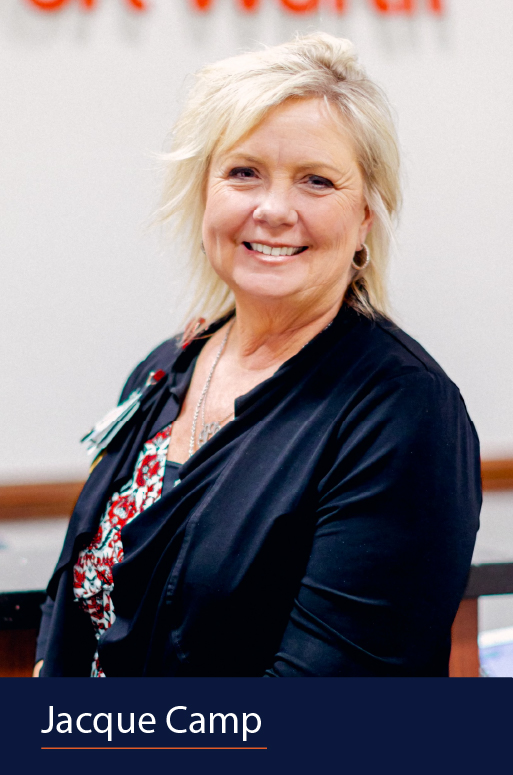
Compassion-Connected Care®. Those words aren’t just a trademarked phrase in our North Texas hospitals, it’s a way of life for Jacque and the patient advocates that support the division. Her passion started with conversations she had with nurses while working as a computer programmer in a Cath lab.
Jacque Camp
Director, Care Experience,
Spiritual Care, and Patient and Family Advocacy
Medical City Fort Worth, Texas and
Medical City Weatherford, Texas
“They dealt with life and death every day, and I could see their level of commitment. It’s truly a calling,” Jacque says. “It’s what inspired me to pursue a career working to support people in those roles. I consider it an honor and privilege every day to love the teams that are caring for our community.”
Jacque’s work takes many forms, but through it all, she and her team spend their days advocating for patients and families, reviewing and sharing patient feedback, and working with staff and providers on how to improve care and experience, including our colleagues’ experience. Improvement opportunities could be as straightforward as addressing what is worrying a patient; compassion alleviates suffering, and that is what we, and Jacque, do well. It is also simplifying patient transfers so that their journey from the emergency department to the nursing unit is more comfortable. Or it might consist of creating a training program for nurses, providing coaching and professional development, or helping a manager stay efficient and effective with colleague rounding by helping them deepen their personal connections.
As a special focus of her holistic approach to healthcare, Jacque works to keep each person’s spiritual needs front and center. The chaplaincy programs at Medical City Fort Worth and Medical City Weatherford fall under her supervision, and they recently began offering weekend church services at Medical City Fort Worth.
We’re constantly looking at the data so that we’re not just reacting, solving the same problem day after day, but we’re making sure we’re fixing processes, providing education and creating solutions.— Jacque Camp, director, care experience
The program was created after hearing that staff working on weekends missed attending church.
“We’re constantly looking at the data so that we’re not just reacting, solving the same problem day after day, but we’re making sure we’re fixing processes, providing education and creating solutions,” Jacque says. “Keeping top of mind the ‘why’ behind what we do in healthcare is so important for our staff to be able to provide patients with compassionate care.”
One thing Jacque reinforces with the nurses at her hospitals is that they can only care for others if they first care for themselves. And she emphasizes the importance of unplugging when not at work.
“Find what rejuvenates you and fills your cup, and that will allow you to give from yourself when you’re at work,” Jacque says.
While she, like many caregivers, can find it challenging to step away, Jacque recharges every May in Utah, taking a vacation with her husband to attend the Rally on the Rocks.
“My family and my faith are the things thatkeep my cup full,” Jacque says.
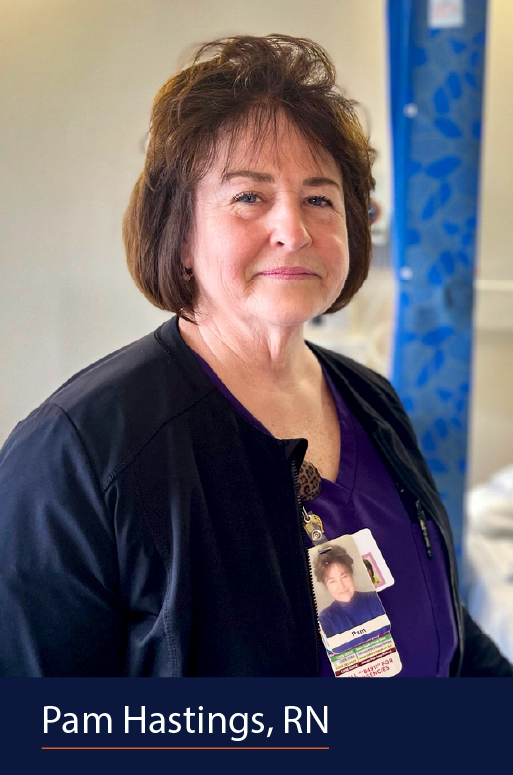
Pam’s day starts at 6 a.m. on the maternity unit, where nurses share updates on what transpired overnight. She learns how many babies were delivered, how many first-time moms are there, and if any babies are classified as late preterm. Then she makes her rounds. It’s not always first-time moms who benefit from Pam’s experience. Every baby is different, and each one brings their own set of challenges. Recently, one mom who had just delivered her third baby asked for Pam’s help.
Pam Hastings, (RN)
Lactation Consultant
Riverside Community Hospital,
Riverside, California
“The baby was not able to sustain the latch in order to feed consistently,” Pam says. “I learned the baby had a small cleft in her palate, and I was able to give the mother a nipple shield, which helped create the negative pressure. That mother was discharged with the confidence she needed to feed her baby and keep her healthy.”
Pam’s responsibilities take her all over the hospital. She might go to the emergency department to make arrangements for a nursing mother to get access to a breast pump, or she might need to review medications prescribed to a nursing mother in the ICU.
My desire to do the best by my patients keeps me interested in my work and wanting to do what I can to research medications and conditions.— Pam Hastings, RN, lactation consultant
“My goal is to see every mother every day, and most days I’m able to do that,” she says.
In addition to her knowledge in lactation, Pam’s vast experience from years as a practicing RN and her passion for continuing to learn new things contribute to her playing a vital role on the team at HCA Healthcare.
“My desire to do the best by my patients keeps me interested in my work and wanting to do what I can to research medications and conditions,” Pam says.
She also networks with colleagues elsewhere to learn what they’re seeing in their neonatal intensive care unit and maternity units, and serves on various professional committees to review hospital policies and procedures.
“Working with new moms to help them fulfill their goals and keep their new babies healthy is such a rewarding job,” Pam says. “In my opinion, I have the best job in the whole hospital.”
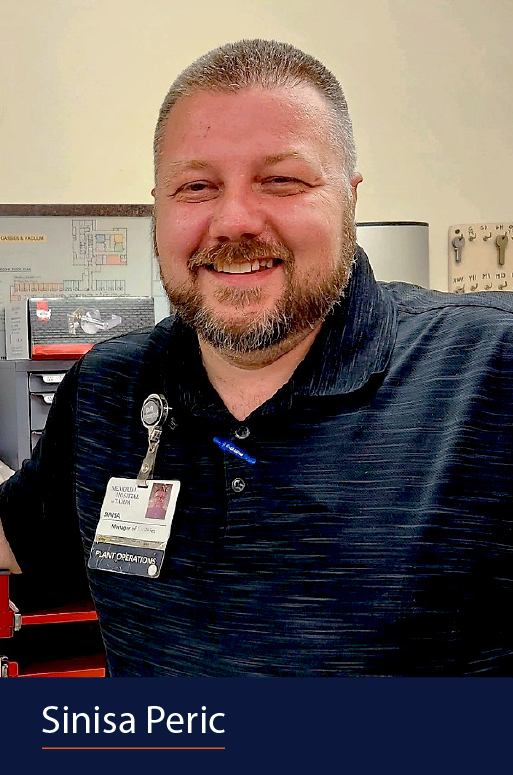
Sinisa Peric arrived in Miami in 2001 with his sister and parents, refugees looking for a place to settle. Born in Croatia, he left with his family during the war in the 1990s and moved around Eastern Europe, landing in Serbia before coming to the U.S.
Sinisa Peric
Manager, Facilities Management
HCA Florida South Tampa Hospital,
Tampa, Florida
“My parents were looking for better opportunities for our family,” Sinisa says.
Once in the U.S., Sinisa started looking for work — anything he could do with his hands — and ended up as a painter in HCA Florida South Tampa Hospital’s facilities management department. Twenty-two years later, he is a manager in that very same department. He keeps things running behind the scenes: everything from daily repairs to infrastructure maintenance to coordinating with contractors on new construction.
“When I first started work, there was another man, Jesse, who was a good plumber. I worked with him and learned what I could. Over time, you learn more about the job from being around people with experience,” Sinisa says.
He also attended technical school as he advanced into management roles. Sinisa promotes the importance of learning on the job and supporting each other as a team. Every day starts with a daily safety huddle to review work orders and issues with his team. Then it’s off to rounding, ensuring all equipment is operating as it should, and check-ins with his leader and the rest of his team throughout the day.
“I make sure they have the tools and supplies they need to complete the job, and if they need an extra hand, I grab my tool belt and go to work with them,” Sinisa says.
My responsibility is to the patients and the staff, to ensure they have a safe, comfortable environment to work and recover in.— Sinisa Peric, manager, facilities management
When emergencies occur, he addresses issues as quickly as possible. In one instance, the hot water heater on the fifth floor sprung a leak. In response, the on-call maintenance colleague contacted Sinisa, and he and the call team responded quickly. They activated the second tank to make sure patients had hot water in their rooms, removed water from the floors and stopped the leak in a matter of hours — and without disrupting patients.
Most of what Sinisa does is felt rather than seen. But his team’s work is of vital importance to the health and safety of every single person who sets foot in the hospital.
“My responsibility is to the patients and the staff, to ensure they have a safe, comfortable environment to work and recover in,” Sinisa says.
He believes it’s just as important for a patient to have the TV working as it is for the temperature and humidity of the operating rooms to be at the right levels for infection control.
“We’re just a bunch of people working behind the scenes, but the reason we’re in this field is because we want to help people,” Sinisa says.
